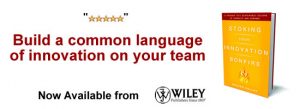Managing the Responsible Emergence of Science and Innovation in Society
 This month sees the release of a book that I am sure will be viewed in the future as a seminal publication in the development of Responsible Innovation.
This month sees the release of a book that I am sure will be viewed in the future as a seminal publication in the development of Responsible Innovation.
Responsible Innovation: Managing the Responsible Emergence of Science and Innovation in Society is edited by Richard Owen, John Bessant and Maggie Heintz and published by Wiley, and is the first real attempt to bring together the broad spectrum of interest in this argument into a single publication.
It is an edited collection, several of the authors being academic but others representing some of the largest innovation institutions currently in operation.
The foreword is by Jack Stilgoe, whose Responsible Innovation blog has long been at the forefront of the debate.
The book opens with a chapter by John Bessant entitled Innovation in the Twenty First Century. After his introduction he goes on to discuss innovation as a process, innovation strategies and the challenges faced by twenty first century innovation. He discusses stakeholders and sustainability before concluding by looking at emergent properties of the new innovation environment.
Chapter 2 is co-authored by many of the leading thinkers in responsible innovation and outlines a framework for responsible innovation, looking at moral imperatives, principles and practice and building capacity.
Rene Von Schomberg is the Directorate General for Research at the European Commission. He has a chapter entitled A Vision of Responsible research and Innovation describes some examples of irresponsible innovation before offering as framework for responsible research and innovation. His chapter is freely available on his personal blog that can be accessed through this article on the Bassetti Foundation website that goes into a little more depth.
Jeroen Van Der Hoven has a chapter about value sensitive design that addresses amongst others the issue of innovation and moral overload. There is a chapter about dialogue and debate with a case study of genetically modified food in the UK, and another about multi level dynamics and soft intervention practices. Ethical debate surrounding the process of innovation is a constant theme throughout the book.
Muniesa and Lenglet have a chapter that looks at innovation in finance, its direction and implications, another is about geo-engineering (a hot topic in Responsible Innovation) and there is also a chapter about innovation in information and communication technology.
The final chapter is entitled Visions, Hype and Expectations; a place for responsibility that takes recent developments in nanotechnology as its case study.
The Endnote entitled Concluding Remarks: building capacity for responsible innovation is written by myself. It offers an overview of the book from my own personal perspective as a blogger, arguing that writing on Innovation Excellence and my technology blog is an efficient way of bringing complex arguments into the domain where they should be addressed, in this case the entrepreneur and innovation community. The endnote section is available for free download from Wiley the publishers here, and really gives an idea of how an individual or organization can try to spread their message using readily available means on the Internet.
Any individual chapter can be downloaded through the publisher’s website but payment is required, and a hard copy can also be ordered.
If a more simple overview of the problem of responsible innovation is more your cup of tea, can I recommend A Handbook of Responsible Innovation from Amazon. Written by myself and a 99 cent download it is an easy read that very much addresses the issues I raise on the Innovation Excellence blog.
image credit: amazon.com
Wait! Before you go…
Choose how you want the latest innovation content delivered to you:
- Daily — RSS Feed — Email — Twitter — Facebook — Linkedin Today
- Weekly — Email Newsletter — Free Magazine — Linkedin Group
 Jonny Hankins is a researcher and writer for the Bassetti Foundation for Responsible Innovation in Milan. Trained as a sociologist at the Victoria University of Manchester UK, his interests range from innovation in the renewable energy sector, bio and medical ethics and the role of politics in innovation, to questions of ethical and moral responsibility. He lives in Boston, MA where he is also a musician, actor and street performer.
Jonny Hankins is a researcher and writer for the Bassetti Foundation for Responsible Innovation in Milan. Trained as a sociologist at the Victoria University of Manchester UK, his interests range from innovation in the renewable energy sector, bio and medical ethics and the role of politics in innovation, to questions of ethical and moral responsibility. He lives in Boston, MA where he is also a musician, actor and street performer.
NEVER MISS ANOTHER NEWSLETTER!
LATEST BLOGS
Starbucks and Big Tobacco
Back in the 1950’s smoking was glamorous, and just about everybody who was anybody smoked cigarettes. Then came the discovery, to the shock of millions, that sucking smoke into your lungs might not be good for you. Then came another revelation that one of the substances in tobacco, nicotine, which was used as a poison by the Egyptians during the times of the Great Pyramids, is addictive. People then began a mass exodus from the consumption of nicotine via inhaled smoke.
Read MoreWal-Mart Goes Green – What about your company?
With the price of gas above $3.00, some companies (and hopefully all) are beginning to look at the fuel efficiency of their fleets. Wal-Mart is the most public example of this with its trucking fleet. Its efforts include:
Read More


